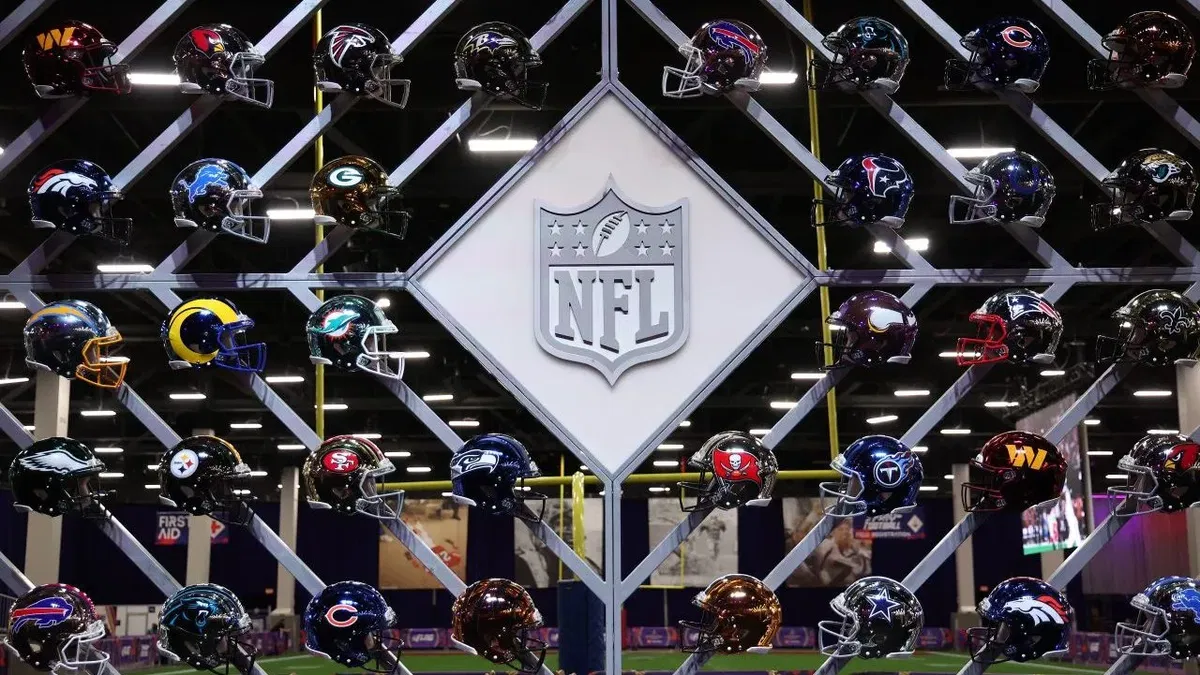

The NFL, often dubbed “America’s Game,” is undergoing a significant shift in its ownership structure with the introduction of private equity investments. This move, designed to unlock new financial avenues, marks a turning point in the league’s governance and ownership landscape.
Watch What’s Trending Now!
While Major League Baseball (MLB), the NBA, and European soccer have already embraced private capital, the NFL is now opening its doors to institutional investors. But what does this mean for the league, its teams, and fans?
In a groundbreaking decision made during the 2024 owners’ meeting, the NFL has officially allowed private equity firms to invest in teams. This rule change permits these firms to acquire up to a 10% stake in an NFL franchise, representing a seismic shift in the league’s historically conservative ownership model. Initially, prominent private equity players like Ares Management, Blackstone, and Arctos Partners received approval, committing a collective $12 billion for investments.
ADVERTISEMENT
This development coincides with a period of unprecedented team valuations. Notably, the Washington Commanders were sold last year for a record-breaking $6.05 billion, and in 2024, the average team valuation climbed to $4.7 billion. Top teams, such as the Dallas Cowboys, are now valued at over $9 billion. This rising valuation trend is pushing more owners to consider liquidity options, and private equity provides a new avenue to unlock significant capital.
The Financial Upside: Expanding Franchise Value
The decision to allow private equity investment in the NFL stems from the league’s need to secure long-term financial growth. All 32 NFL franchises are currently valued at over $4 billion, with recent sales reflecting even higher valuations. For instance, the 2023 sale of the Washington Commanders for a record-breaking $6.1 billion highlights the financial might of the league and its appeal to deep-pocketed investors.
ADVERTISEMENT
Allowing private equity investments truly gives teams more flexibility when raising capital. Previously, team owners needed to rely heavily on personal wealth or high-net-worth individuals to fund operations and improvements. Now, with private equity firms entering the picture, teams can access much larger pools of capital. This can be particularly advantageous for small-market teams that may not have the financial clout of franchises like the Dallas Cowboys or New England Patriots.
In recent years, private equity has gained a foothold across American sports. The NBA, MLS, and NHL each have approved policies that allow private equity firms to acquire minority stakes in franchises. The NFL, long cautious about such outside investments, is following suit, but with stringent regulations. Teams can only sell up to 10% of their ownership stakes to private equity, ensuring that majority control remains with traditional owners.
ADVERTISEMENT
The Commanders’ Sale: A Case Study
The sale of the Washington Commanders in 2023 is a perfect case study of this trend. Dan Snyder, the team’s former owner, decided to sell, and a consortium led by Josh Harris, who co-owns the Philadelphia 76ers, stepped in. Harris, a prominent private equity figure, and his investors acquired the team for $6.1 billion. This deal not only set a new record for NFL team sales but also demonstrated the growing influence of private equity in the league.
Top Stories
Sean McDermott Announces Bad News for Josh Allen as Bills QB Rings Alarm Bells

Baltimore Ravens Make Kevin Stefanski Announcement After Firing John Harbaugh for Lamar Jackson Fallout

NFL Legend Terrell Owens, Terry Bradshaw’s Wife & More Share Messages After ICE Shooting Controversy

Veteran NFL Announcer Al Michaels Makes Decision on Retirement

Lamar Jackson Finally Reacts to John Harbaugh After Reportedly Turning On Fired Ravens Coach

The Harris-led group illustrates the balancing act the NFL faces. While private equity can offer fresh investment, the league remains committed to maintaining the traditional structure of ownership that prioritizes local and family-led control. However, the success of the Commanders’ sale signals that private equity can align with the NFL’s values when handled with care.
ADVERTISEMENT
Governance Implications: Who’s Really in Control?
The rise of private equity in NFL ownership raises crucial questions about governance. Private equity investors are known for prioritizing short-term profits, which could clash with the long-term visions of traditional NFL team owners. Unlike family-owned franchises, private equity firms expect returns on their investments within specific timeframes. This could lead to pressure for immediate financial results, possibly at the expense of team-building or community engagement.
The NFL’s decision to cap private equity ownership at 10% reflects a recognition of this potential conflict. By limiting the influence of outside investors, the league hopes to prevent a fundamental shift in team governance. However, as teams rely more on private capital, tensions could emerge between ownership groups over the direction of franchises.
ADVERTISEMENT
Franchise owners traditionally focus on building sustainable success over decades, often prioritizing the fan experience, community involvement, and legacy. The entry of profit-driven private equity firms could challenge this approach, particularly for smaller teams struggling to compete financially with larger franchises.
A Look to the Future: Investors’ Opportunities and the Fan Experience
For fans, the introduction of private equity is unlikely to bring immediate, visible changes. Most of the investment will be behind the scenes, fueling stadium renovations, enhancing digital platforms, and improving team operations. For example, upgrades at Ford Field and Allegiant Stadium illustrate how private equity is driving enhancements in fan experience and technology.
ADVERTISEMENT
However, the long-term impact on the fan experience could be more profound. Teams that embrace private equity investments might prioritize profitability over fan engagement, driving up ticket prices, focusing more on corporate sponsorships, or even changing stadium policies to cater to premium customers.
On the other hand, private equity could also lead to innovations that benefit fans. With increased investment in technology, fans might see improvements in stadium experiences, such as enhanced mobile apps, real-time betting platforms, and immersive virtual reality experiences during games. Additionally, teams that struggle financially could become more competitive on the field with a steady influx of private capital.
As private equity makes its entrance into the NFL, investors stand a unique chance to be part of a transformative chapter in sports finance. For those looking to capitalize on this evolution, it’s crucial to keep an eye on a few key factors. Look for teams that are strategically investing in fan engagement and technological advancements, as these are likely to yield long-term gains. Additionally, monitor how teams balance profitability with preserving the essence of their brand, as this will impact their sustained value and market appeal. In this new landscape, informed investors will be those who navigate both the financial opportunities and the evolving dynamics of NFL ownership.
ADVERTISEMENT
NFL’s Private Equity is About ‘Balancing Tradition and Innovation’
Experts in sports finance have noted that, while the influx of private equity could revolutionize the league, it must be carefully managed to avoid diluting the essence of the NFL.
Experts point out that while the league benefits from its long-established governance model, the influx of private equity brings new financial dynamism and challenges. According to sports economist Professor Andrew Zimbalist, the NFL’s concern with public or external ownership stems from the potential instability it could introduce by disclosing sensitive financial data, which could disrupt management structures and long-term strategies.
ADVERTISEMENT
Similarly, as noted in the
2024-25 NFL Season Business Preview, the league is also grappling with how to maintain its historic brand image while capitalizing on new revenue streams. The integration of private equity could impact team valuations, with a growing emphasis on media rights and commercial partnerships.The NFL’s multi-billion-dollar media deals—specifically, the Amazon partnership for Thursday Night Football—are shaping how the league approaches business innovation, reflecting the push-pull between traditional team ownership models and modern commercialization.
Experts agree that the NFL must carefully manage this integration. As private equity brings capital, it also introduces a culture focused on profit maximization, which may at times conflict with the league’s commitment to community, competitive balance, and long-term team stability. This shift towards commercial innovation, while critical for staying competitive globally, must align with the values that have built the NFL’s success over the decades.
I’d say private equity entry into the NFL is a double-edged sword. It promises to boost franchise values and spur innovation, but it also brings potential governance challenges. As the league navigates this new landscape, maintaining a balance between financial growth and preserving the league’s traditions will be key. For fans, the future will reveal whether this shift leads to a richer, more engaging NFL experience or if it widens the gap between ownership’s financial goals and the sports community-driven spirit.ADVERTISEMENT
ADVERTISEMENT
ADVERTISEMENT

